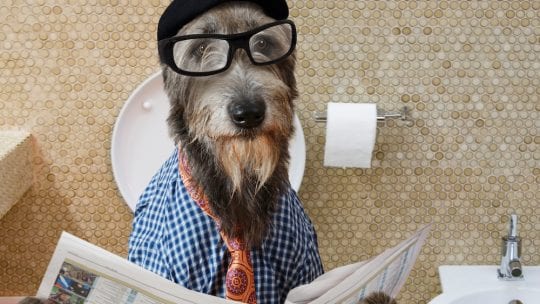
[Editor's Note: Today's (June 25) observance of National Take Your Dog to Work Day may seem out of place as so many of us work from home. On the other hand, dogs and pets are proving vital to the human spirit during the pandemic. In addition, dogs are helping search for life at the tragic scene in Surfside, FL. We hope the essay below offers some enjoyment at this grim moment.]
Intuitive, courageous, loyal, adaptable and driven. These are characteristics that describe great leaders in PR and other industries. But they also capture the dogged devotion of man’s best friend.
So, if your boss's behavior reminds you of a dog, you're lucky. The same qualities that make canines great companions make leaders even better bosses.
Here are traits successful leaders share with dogs:
1. Like a good boss, dogs are unfailingly loyal. Loyalty in the workplace is becoming increasingly uncommon. So, when you find a boss who is loyal to employees, hang on tight. Like a dedicated dog, a loyal boss will not sell you out when times get tough. Of course, loyalty begets loyalty. Bosses who treat employees well are rewarded when staff work hard to have the leader's back.
2. Dogs are pack animals that rely on a leader. A successful boss is comfortable taking charge and leading the 'pack.' Having a leader who assumes responsibility for highs and lows is a valuable asset in a world where finger-pointing and the blame game are common. The leader maintains order, so the pack lives in peace. The same is true for a CEO keenly attuned to team needs.
3. Dogs are energetic and filled with excitement. So are enthusiastic CEOs, who funnel energy into new ideas, fresh angles and different directions. A leader who is an interested and engaged communicator is more likely to grow the company and try things outside traditional parameters. Bosses who can communicate ideas with zeal are more likely to succeed because challenges and the unknown motivate them.
4. Great dogs can be found in all shapes, sizes and breeds. The same is true with great leaders, who range from conservative to unconventional. It is not their outward trappings that make them great, but the ability to transcend stereotypes and shine, despite society's often rigid expectations.
A wiry chihuahua may be a fiercer adversary than a lumbering, enormous Great Dane. The same is true for strong leaders. “Never judge a book by its cover” when evaluating CEOs.
Good Leaders Stand Behind Employees
5. Dogs protect people who care for them. Good leaders stand behind workers they employ. Dogs are known to fiercely defend their owners when threatened. It is an admirable quality that reinforces owner loyalty and strengthens feelings of affection toward their pet. A leader who communicates loyalty to staff and stands up for employees instead of blaming them for poor results will enjoy the same kind of loyalty and devotion from team members who feel valued and secure.
6. Dogs are not easily intimidated; neither are strong leaders. A dog communicates its sense of loyalty, devotion and duty to its master. This forms a strong foundation that does not easily lend itself to intimidation. A leader communicates loyalty and strength to employees by establishing clear lines of communication for the same result.
Outside forces' intimidation plays no part in the confident CEO’s way of doing business. Because appearances can be deceiving, a strong CEO knows it is not the size of the dog in the fight, but the size of the fight in the dog that matters.
7. A dog’s ability to learn tricks parallels an effective leader’s ability to change with the times, adopt new practices and embrace technologies and communicate clearly with employees. Progressive CEOs are continually growing and adapting to new people, places, business practices and ideas. “Those who never change their minds, never change anything.”
Resilience and Drive
8. Dogs have unending resilience and drive. That’s why they can play for hours, then switch gears and dig a hole or fetch a stick. Determined leaders have a similar drive and resilience. They too can switch quickly from one task to another and never give up until the job is done. They know exponential growth comes from taking calculated risks and making large-scale changes.
9. Dogs are alert, watchful and can sense danger. Leaders who can read between the lines, detect lies and sense threats before they materialize are invaluable in an environment where PR crises lurk. An experienced leader is not easily fooled by appearances and can often anticipate trends and industry shifts.
10. Dogs command respect, but never abuse it. Some of the most intimidating dogs are the most docile and sweet unless you mean them ill. Great bosses won’t flaunt the fact that they could fire you and your entire division on a whim if they wanted. Do your job well and you are likely to succeed.
11. Dogs are likable and love making friends. A CEO often is a company's face. Being able to communicate with the public, meet people and increase the client base are invaluable attributes.
Imagine a leader who communicates with the quirks of some cats. You likely wouldn’t enjoy working for and with someone who was highly independent, aloof, unpredictable, cold and temperamental.
While fine for a kitty, these adjectives likely would not inspire employee confidence or be much fun day-to-day.
On the other hand, wonderful dogs and outstanding CEOs have an uncanny ability to make us feel like superheroes. They communicate their intentions through action, force us to think beyond ourselves and challenge us to invest time and energy to meet their levels of attention and dedication.
Evan Nierman is founder and CEO of Red Banyan
